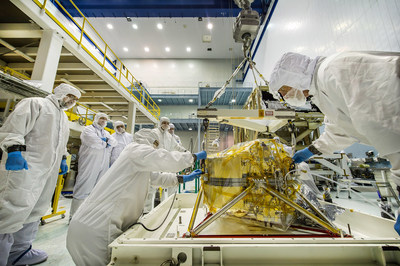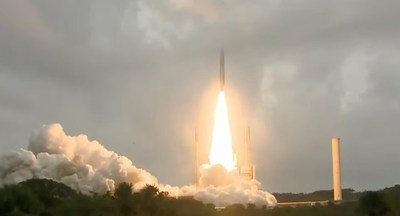NASA's James Webb Space Telescope Lifts Off with Advanced Camera from Lockheed Martin
The NASA James Webb Space Telescope successfully launched on December 25, 2021, utilizing the Near Infrared Camera (NIRCam) developed by Lockheed Martin (NYSE: LMT). NIRCam is a crucial component for the telescope, capable of aligning its mirrors and capturing the universe's oldest light. Designed to function in extreme conditions, NIRCam measures light distortions with nanometric accuracy, ensuring optimal telescope performance. This collaboration between Lockheed Martin and the University of Arizona marks over two decades of engineering and innovation, paving the way for groundbreaking astronomical observations.
- Successful launch of NASA's James Webb Space Telescope.
- NIRCam developed by Lockheed Martin, a key instrument for the telescope.
- NIRCam's capability to capture the universe's oldest light and assist in mirror alignment.
- Over two decades of engineering culminated in successful NIRCam integration.
- None.
Insights
Analyzing...
KOUROU, French Guiana, Dec. 25, 2021 /PRNewswire/ -- With the liftoff of NASA's James Webb Space Telescope from French Guiana today, humankind is one step closer to seeing the universe in a whole new light, with help from a camera built by Lockheed Martin [NYSE: LMT]. The instrument will be key in giving the telescope its first glimpse of celestial light.
The Near Infrared Camera (NIRCam) is Webb's primary imager and one of the most sensitive infrared cameras ever built. As the telescope sets itself up in space, NIRCam will help align Webb's intricate array of mirrors. It will then take science images throughout the entire mission.
"NIRCam's journey is over two decades in the making, and seeing it lift off into space on Webb was the culmination of many years of hard work with Marcia Rieke and our University of Arizona partners," said Alison Nordt, Lockheed Martin's space science and instrumentation director, who led development of NIRCam. "Webb will rewrite the science books of how we understand our universe, and to have Lockheed Martin-built technology help advance the future of space imaging is an honor."
The Lockheed Martin and University of Arizona team designed, built and tested NIRCam out of the company's Advanced Technology Center in Palo Alto, California.
How to Look at the Universe's Oldest Light
Webb is designed to peer at the universe's oldest light, which scientists believe occurred around 13.5 billion years ago. As the universe expands, those light waves that were once visible have now shifted into the infrared spectrum.
This light is incredibly far away and extremely dim, which is why Webb requires large mirrors – along with NIRCam's ultra-precise optics – to see it.
Before that can happen, NIRCam's first job is to sense incoming infrared light and take images that will help the telescope's systems properly align its 18 primary mirror segments. This is critical to ensuring Webb provides crystal clear images once it enters science mode.
The Technology Behind NIRCam
For Webb's mirror alignment in early 2022, NIRCam senses what's called a "wavefront," or an ideally perfect sphere of light particles emitted from any luminescent object. When those particles encounter another object – in this case, the telescope's optics – they become distorted.
NIRCam measures those distortions with nanometric accuracy, and that data is then used to advise how Webb's mirrors must adjust. This iterative process is done until the telescope's mirrors are properly aligned.
With Webb traveling more than 1 million miles from Earth into space, NIRCam must function with extreme precision and stability in temperatures as cold as -400°F. In fact, the telescope needs frigid temperatures to ensure infrared radiating off the observatory doesn't overwhelm the images.
To enable operations in such extreme conditions, Lockheed Martin developed a new technique for bonding NIRCam's optical lenses to their mounts. The innovative method ensures the cold and launch vibrations don't cause shifts in alignment of NIRCam's lenses.
After more than a decade of meticulous engineering and rigorous testing, the team delivered one of the most capable infrared instruments ever created, and NIRCam was fully integrated onto Webb in 2014.
Now, the telescope gets situated for a decade of ground-breaking observations to shape how we see space for years to come.
More About the Mission
The Webb Space Telescope is the world's newest premier space science observatory. It will solve mysteries in our solar system, look beyond to distant worlds around other stars, and probe the mysterious structures and origins of our universe and our place in it. Webb is an international program led by NASA with its partners – the European Space Agency and the Canadian Space Agency – and industry participation from many companies, including Lockheed Martin.
Learn more about NIRCam on LockheedMartin.com.
About Lockheed Martin
Headquartered in Bethesda, Maryland, Lockheed Martin (NYSE: LMT) is a global security and aerospace company that employs approximately 114,000 people worldwide and is principally engaged in the research, design, development, manufacture, integration and sustainment of advanced technology systems, products and services.
Please follow @LMNews on Twitter for the latest announcements and news across the corporation.
![]() View original content to download multimedia:https://www.prnewswire.com/news-releases/nasas-james-webb-space-telescope-lifts-off-with-advanced-camera-from-lockheed-martin-301450793.html
View original content to download multimedia:https://www.prnewswire.com/news-releases/nasas-james-webb-space-telescope-lifts-off-with-advanced-camera-from-lockheed-martin-301450793.html
SOURCE Lockheed Martin









